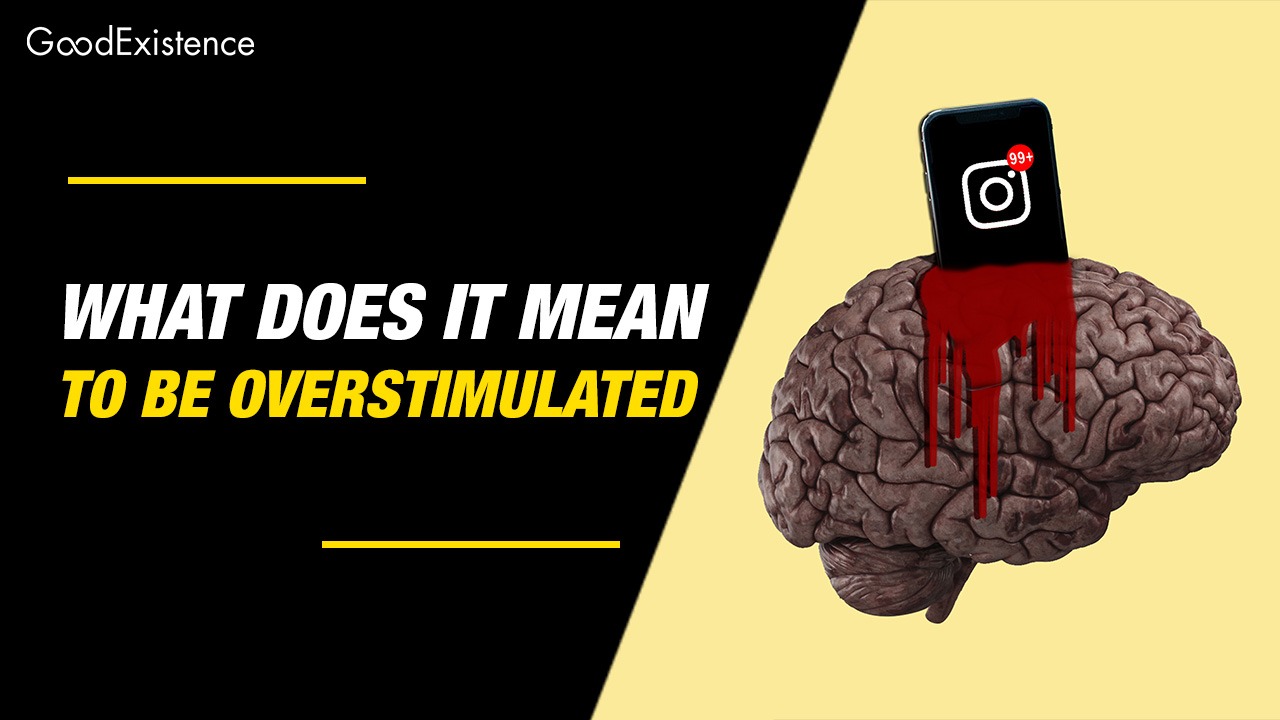In the hustle and bustle of our modern lives, there’s a term that often pops up – overstimulation. But what does it mean to be overstimulated?

It’s like having a hundred TV channels broadcasting in your mind, each one vying for your attention. The noise grows until it’s a loud roar, drowning out your own thoughts.
Sounds familiar?
Let’s dive into the realm of overstimulation, understand its mechanics, and explore how it impacts our lives.
The Nature of Overstimulation
Addressing the question, ‘what does it mean to be overstimulated?‘ requires a look into how our brains respond to the world around us.
Overstimulation occurs when we are bombarded with more information, sensations, or activities than our brain can process.
Imagine a computer with too many tabs open; eventually, it slows down, freezes, or crashes.
Similarly, our brain struggles to keep up, affecting our ability to think clearly and act accordingly.
Causes of Overstimulation

In exploring ‘what does it mean to be overstimulated,’ identifying the root causes is crucial.
There are numerous factors that can lead to overstimulation. These triggers vary from person to person, as each individual has a unique threshold and response to stimuli.
Understanding the root causes of overstimulation is the first step toward addressing it effectively. Here’s a breakdown of some common causes:
- Environmental Factors:
- Loud Noises: Continuous exposure to high decibel levels can cause overstimulation.
- Bright Lights: Bright or flashing lights can be overwhelming, especially in large crowds or busy areas.
- Crowds: Busy places with lots of people can lead to sensory overload.
- Digital Overload:
- Constant Connectivity: The need to be constantly connected can cause mental fatigue.
- Social Media: The endless scroll of social media can be overstimulating.
- Information Overload: The endless barrage of news, messages, and notifications can be overwhelming.
- Emotional Triggers:
- Stress: High levels of stress can result in overstimulation.
- Anxiety: Anxiety and worry can trigger a state of overstimulation.
- Social Interactions:
- Social Demands: The demands of social interactions can be exhausting, especially for introverts.
- Conflict: Conflict or confrontational situations can also lead to overstimulation.
- Physical Factors:
- Lack of Sleep: Sleep deprivation can lower the threshold for overstimulation.
- Caffeine and Stimulants: These can heighten sensitivity to stimuli.
- Health Conditions:
- ADHD: Individuals with Attention-Deficit/Hyperactivity Disorder may experience overstimulation.
- Sensory Processing Disorders: These disorders can cause sensitivity to sensory stimuli.
Each cause can operate alone or in conjunction with others, creating a complex network of triggers that can lead to overstimulation.
Identifying personal triggers and working towards managing or mitigating them is essential to maintaining a balanced state of mind.
Overstimulation is akin to having too many applications running on your phone simultaneously. Initially, the phone might slow down, and lag, and if the overload continues, it could freeze or crash.
Related: Running on 4 Hours of Sleep? Try These Tips
Similarly, overstimulation bogs down our mental processes, making it hard to think clearly, make decisions, or even interact with others effectively.
This analogy vividly shows how too much stimulation can adversely affect our mental state and overall quality of life.
Recognizing what causes overstimulation in your life is the first step toward addressing it.
Once you understand the triggers, you can take steps to manage or reduce overstimulation, improving not only your mental health but also your overall quality of life.
The Brain on Overdrive

To understand what it means to be overstimulated, examining the brain’s reaction during such state is helpful.
Delving into how the brain reacts when overstimulated sheds light on why it’s crucial to maintain a balance between stimulation and relaxation.
When the brain is overstimulated, its neurotransmitters become overactive, which can lead to mental fatigue.
It’s like a car engine running at high speed for an extended period; eventually, it’s going to overheat.
This overload can also impair the brain’s ability to process information, make decisions, and create memories.
Furthermore, continuous overstimulation can affect the brain’s plasticity, which is its ability to change and adapt over time.
Impact on Mental Health
Recognizing the impact of overstimulation on mental health is crucial.
Overstimulation can lead to anxiety, depression, and other mental health issues (source). It’s essential to recognize the impact and take steps to alleviate the symptoms.
Over time, living in a state of constant overstimulation can create a chronic stress response in the body, affecting both mental and physical health.
This chronic stress may lead to inflammation, which has been linked to various health issues, including heart disease and cancer.
Moreover, the perpetual cycle of stress and overstimulation can hamper one’s ability to cope with everyday challenges, leading to a decline in overall quality of life.
Coping Strategies

From practicing mindfulness to simplifying one’s lifestyle, various strategies can help manage overstimulation and improve overall well-being.
It might be beneficial to create a daily routine that includes time for relaxation and self-reflection.
This could be as simple as dedicating time each day for a walk in nature, practicing meditation, or engaging in hobbies that promote relaxation.
Furthermore, learning to say no and setting boundaries can also help manage the level of stimulation, making life more manageable and less overwhelming.
Mindfulness and Overstimulation
In the quest to answer ‘what does it mean to be overstimulated,’ mindfulness emerges as a potent tool.
Mindfulness, the practice of staying present and fully engaging with the here and now, is a powerful tool against overstimulation.
It trains the brain to process experiences without feeling overwhelmed. By practicing mindfulness, individuals can learn to respond to stimuli in a calmer, more balanced manner.
This practice also promotes awareness of one’s thoughts and feelings, which is the first step in recognizing and addressing overstimulation.
Moreover, mindfulness encourages a non-judgmental attitude, which can alleviate the stress associated with overstimulation.
The Role of Technology

Technology, with its incessant notifications and constant connectivity, is a significant source of overstimulation.
Learning to manage our digital lives is crucial for mental peace.
Setting specific times for checking emails and social media, or even taking digital detox days, can significantly reduce overstimulation.
Moreover, utilizing features like “Do Not Disturb” or customizing notifications can help manage the digital onslaught.
It’s about taking control of technology rather than allowing it to control us.
The Balance of Stimulation
Finding the right balance between stimulation and relaxation is key. It’s about understanding your limits and creating a conducive environment for your mental health.
Everyone has a unique threshold for stimulation, and understanding your own can lead to a more balanced and fulfilling life.
It might require some lifestyle adjustments or even a change in environment to find what works best for you.
Embracing a balanced approach towards stimulation can significantly enhance one’s quality of life and mental well-being.
Overstimulation in Children

When pondering ‘what does it mean to be overstimulated,’ the vulnerability of children to this condition is a crucial aspect.
Children are particularly susceptible. Recognizing the signs and providing a supportive environment can help manage overstimulation in young minds.
Fostering a nurturing and structured environment can significantly help in reducing overstimulation.
Additionally, teaching children coping strategies such as breathing exercises or providing a quiet space for relaxation can be very beneficial.
Understanding and addressing overstimulation in children is crucial for their development and long-term mental health.
Overstimulation in Adults
Adults, too, face this challenge. The demands of modern life can lead to a constant state of overstimulation, affecting productivity and personal relationships.
Creating a supportive environment, both at home and in the workplace, can help manage overstimulation.
Furthermore, cultivating a culture that values mental health and promotes balanced living is vital.
It’s about creating a lifestyle that honors both the need for stimulation and the necessity of relaxation and self-reflection.
The Society and Overstimulation

Our fast-paced society often promotes a lifestyle that leads to overstimulation.
Reflecting on societal norms and values can help foster a culture that values mental well-being.
It might require a shift in societal attitudes towards a more balanced lifestyle, valuing rest and relaxation as much as productivity and achievement.
Encouraging discussions on mental health and promoting awareness about the effects of overstimulation can contribute to a healthier, more balanced society.
The Road to Recovery
Recovery is a journey. With the right support and coping strategies, overcoming overstimulation is within reach.
It might require a multidisciplinary approach, incorporating lifestyle changes, praying, mindfulness practices, and possibly professional help.
Overcoming overstimulation is not about eliminating stimuli, but learning to interact with the world in a balanced and healthy way.
Understanding Overstimulation – Finding Help
Uncovering ‘what does it mean to be overstimulated’ also entails finding avenues for help and support.
Seeking professional help, joining support groups, and educating oneself are steps toward managing overstimulation effectively.
A well-informed approach can significantly enhance the journey towards overcoming overstimulation.
There are numerous resources available, from self-help books to professional counseling services that can provide guidance and support.
When feeling overwhelmed, seeking help is a sign of strength. Taking the first step to manage overstimulation is a giant leap towards a balanced and fulfilling life.
What Does It Mean to Be Overstimulated? – FAQs
What are the common signs of overstimulation?
Feeling overwhelmed, irritable, anxious, or having difficulty concentrating are common signs.
How can one manage overstimulation?
Practicing mindfulness, managing digital consumption, and seeking professional help are effective ways.
Can overstimulation lead to other mental health issues?
Yes, it can lead to anxiety, depression, and other related issues.
How does technology contribute to overstimulation?
Constant notifications, social media, and the demand for immediate responses contribute significantly.
What steps can society take to reduce overstimulation?
Promoting praying, mindfulness, valuing mental health, and fostering supportive environments are essential steps.
See also in Mindset
What To Do When You Dont Know What To Do
15 Ways to Enhance Logical Reasoning
20 Strategies for Problem Adaptation
25 Ways to Improve Your Judgment
20 Strategies for Overcoming Fear of Public Speaking
Positive Thinking Hacks for Cold Weather Blues